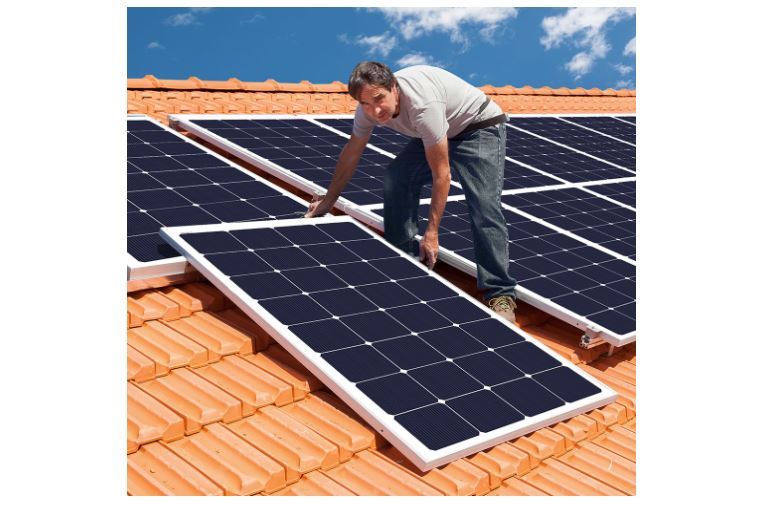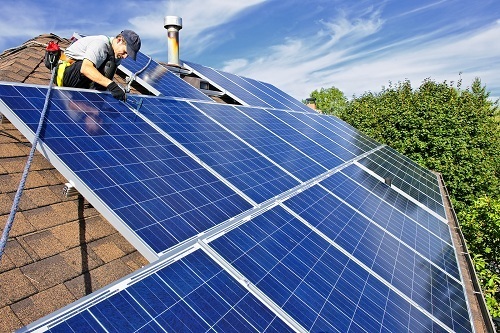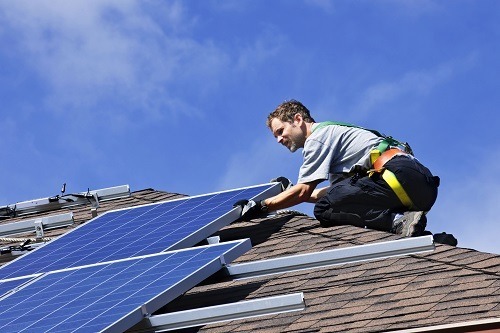A typical American house will require 14-36 solar panels for home to cover their electricity bill and a minimum of 227 square feet of rooftop area to install the solar panels.
Read on to determine the number of solar panels your home will need.
Solar energy is an exceptional energy choice that saves you money on your energy bills by supplying enough energy for your home's energy use.
Solar panels work by getting energy from the sun, carrying energy through a solar inverter, and transforming this energy into electricity.
The amount of energy that solar panels can consume from the sun and then provide as input is quantified in kilowatts (kW).
The quantity of energy your home uses over a particular interval, say a month, is quantified in kilowatt-hours (kWh).
You will require to know how many kWh your house uses to ascertain the number of kWs your panels will need to produce to offset your usage.
You can use this information to determine the number of panels your home will need.
How Many Panels Are Required To Power A Home?

Interestingly, house size does not determine the number of solar panels you want; a bigger home does not necessarily equal more energy usage.
To truly know the number of solar panels your solar power system demands, you need to understand the following:
You can also use a solar panel calculator (many solar power installers have one) to give you an exact amount of panels by entering your address and the amount of your monthly power bill.
These calculators includes generation data and can show you savings and the price you'll receive from going solar.
How Many Solar Panels Do I Need Per Kwh Per Month?

According to The U.S. Energy Information Administration, in 2018, the average annual power consumption for a house in America has been 914 kWh per month, roughly 30.5 kWh every day and 11,000 kWh each year.
But every home is unique and might use more or less electricity than the average family.
Other variables will impact solar panel efficiency like roof orientation, shade, and the climate where you live.
To help you estimate the size of solar array your house will need, the below chart could offer clarity.
Header | Average Yearly electricity consumption for all homes | Size of Solar system Required to produce average electricity | Number of solar panels needed |
|---|---|---|---|
Midwest - Illinois | 8,929 kWh | 7 kW | 25 |
Northeast - New Jersey | 8,280 kWh | 7 kW | 25 |
West - California | 6,522 kWh | 4 kW | 14 |
South - Texas | 14,112 kWh | 10 kW | 36 |
This table breaks down the average yearly electricity use for each region in America. California, New Jersey, Illinois, and Texas, the four nations listed, offer some of the finest solar incentives for their particular areas.
As you can see, average energy usage varies for a couple of reasons.
For example, the northeast is urban, with numerous multi-family homes versus the south with more single-family homes.
We note above the solar system size required in each region to offset that specific region's average electricity usage.
To pay for house energy needs in California, you’ll need a 4kW energy system to create 6,522 kWh of electricity.
The numbers vary mostly due to each region's climate.
For example, you need a smaller system in southern California because the sun shines throughout the year. But you need a somewhat larger system in New Jersey as there are longer winters and more cloudy days to consider.
Last, we list the quantity of 280W panels necessary to produce the electricity. This is a middle-ground panel wattage amount for 2020 installations.
That said, the energy usage of your home could be different than the average.
You may use a solar panel calculator to work out how many solar panels quoted in the table above will cost your state.
Although before you do that, it's worth taking note of your house's dimensions, and your electricity use varies from the norm since this will determine the number of panels you require.
How Much Roof Area Do I Need For Solar Panels?

Even if you know the number of solar panels you need, it won't help if your roof can't fit them.
Solar panel efficiency means your solar panel is either okay, good, or great at absorbing energy production sunlight. Higher efficiency panels indicate you require less of them, and hence, less square footage of roof area to generate energy.
Once you ascertain the kW size of the panel system you'll need, have a look at a higher, moderate, or low-efficiency panel will take up on your roof. Those who have space to spare may make sense to purchase efficiency panels as they can create the same quantity of electricity and are less expensive than efficacy.
It is more necessary to have a panel that generates watts of electricity versus a more efficient panel, but to use the smallest quantity of panels on your roof, you'd need the most efficient, highest-wattage producing panel.
Knowing which efficiency-level solar panel is reasonable for your house will depend on the dimension of your home.
How Do I Find The Solar Panel I Need For My Home?

The best way to ascertain the number of panels your house needs is by working with installers.
They'll have the ability to figure out the amount and the type of solar panels that will work best for your dwelling.
Solar panels are an excellent way to decrease or cancel your electricity bill and take benefit of other money-saving services such as federal incentives and net metering.

